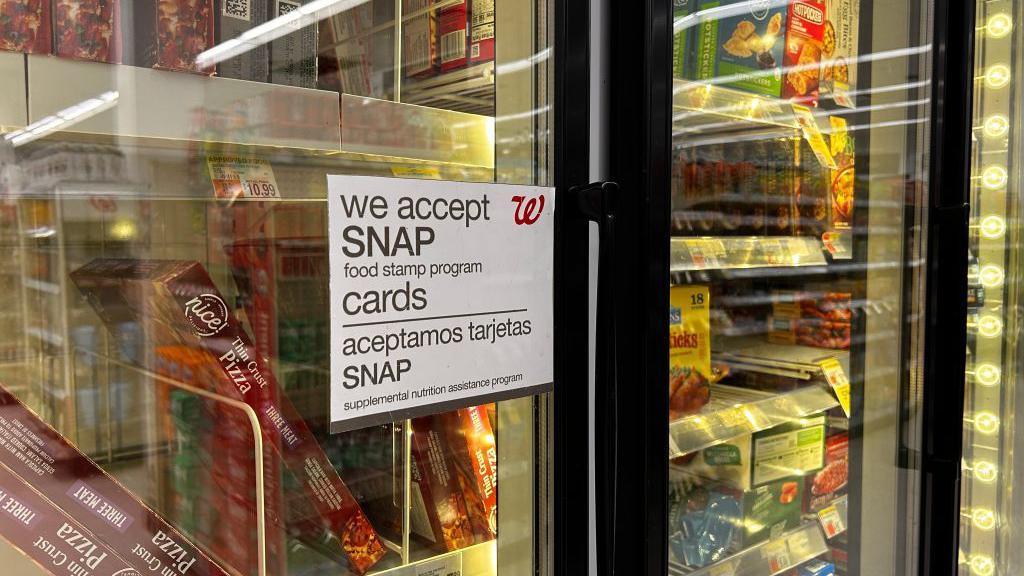Federal judges have ruled that the Trump administration cannot suspend food aid relied upon by over 40 million low-income Americans amidst the ongoing government shutdown.
In decisions issued in quick succession on Friday by judges in Rhode Island and Massachusetts, the government was instructed to utilize emergency funds to ensure the continuation of benefits under the Supplemental Nutrition Assistance Program (SNAP).
SNAP operates by providing beneficiaries with reloadable debit cards for the purchase of essential grocery items.
The U.S. Department of Agriculture (USDA) had previously announced its inability to distribute food assistance funds in November due to the shutdown, citing depleted resources.
On average, a family of four receives $715 monthly through SNAP, equating to slightly less than $6 per person per day.
States administer SNAP benefits, utilizing funds from the federal government, which has been unfunded since October 1.
While several states have committed to using their own funds to cover potential shortfalls, the federal government has cautioned that they will not receive reimbursement.
Half of U.S. states filed lawsuits against the Trump administration in response to the proposed funding halt, seeking to compel the use of an approximately $6 billion emergency contingency fund for SNAP, also known as food stamps.
The Massachusetts judge mandated that the administration access the contingency funding to ensure benefit payments, with a deadline of Monday to report to the court regarding the authorization of at least partial benefits for November.
U.S. District Judge Indira Talwani of Massachusetts stated in her decision that the plaintiff states are likely to prevail in their claim that “Congress intended the funding of SNAP benefits, at a reduced rate if necessary, when appropriated funds prove insufficient.”
Judge Talwani also noted that the Trump administration “erred in concluding” that the USDA is legally restricted from accessing emergency reserves in the contingency fund during a lapse in federal funding.
The USDA had argued that these reserves were insufficient to cover full benefits, which amount to $8.5 billion to $9 billion each month, with the Secretary stating the fund would only be used for emergencies such as natural disasters.
According to the Center on Budget and Policy Priorities (CBPP), even with access to the contingency fund, it would only cover benefits for approximately 60% of beneficiaries for a single month.
Judge Talwani has requested a report from the administration by Monday outlining whether it will utilize the fund to pay reduced benefits or move funds from other programs to cover full benefits for the month, similar to the recent transfer of military research funds to pay members of the armed forces.
In a separate case in Rhode Island, a lawsuit was filed by U.S. cities and NGOs contesting the “unlawful suspension” of the program.
U.S. District Judge John McConnell stated, “There is no doubt, and it is beyond argument, that irreparable harm will begin to occur, if it hasn’t already, in the terror it has caused some people about the availability of funding for food for their family.”
The White House and the USDA have not yet issued statements on the rulings. The BBC has also reached out to the Office of Management and Budget for comment.
Prior to the rulings, Agriculture Secretary Brooke Rollins stated at a news conference, “We’re looking at all the options” when questioned about the administration’s compliance should courts mandate the release of funds.
On Friday, the group behind the Rhode Island lawsuit issued a statement asserting that the ruling “is a lifeline for millions of families, seniors, and veterans who depend on SNAP to put food on the table.”
“It reaffirms a fundamental principle: no administration can use hunger as a political weapon.”
Republicans and Democrats have exchanged blame for the federal shutdown, now approaching its second month, with no significant progress toward a resolution.

